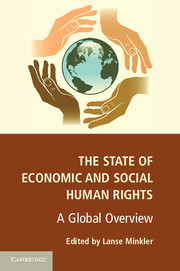Book contents
- Frontmatter
- Contents
- Contributors
- Acknowledgments
- 1 Introduction: Why Economic and Social Human Rights?
- I CORE RIGHTS
- 2 The Right to Food: A Global Perspective
- 3 Globalization and the Right to Health
- 4 Demolishing Housing Rights in the Name of Market Fundamentalism: The Dynamics of Displacement in the United States, India, and South Africa
- 5 Implementation of the Human Right to Social Security around the World: A Preliminary Analysis of National Social Protections Laws
- 6 Why Is the Right to Work So Hard to Secure?
- II NONDISCRIMINATION
- III META
- Index
- References
5 - Implementation of the Human Right to Social Security around the World: A Preliminary Analysis of National Social Protections Laws
Published online by Cambridge University Press: 05 February 2013
- Frontmatter
- Contents
- Contributors
- Acknowledgments
- 1 Introduction: Why Economic and Social Human Rights?
- I CORE RIGHTS
- 2 The Right to Food: A Global Perspective
- 3 Globalization and the Right to Health
- 4 Demolishing Housing Rights in the Name of Market Fundamentalism: The Dynamics of Displacement in the United States, India, and South Africa
- 5 Implementation of the Human Right to Social Security around the World: A Preliminary Analysis of National Social Protections Laws
- 6 Why Is the Right to Work So Hard to Secure?
- II NONDISCRIMINATION
- III META
- Index
- References
Summary
Introduction
Article 22 of the 1948 Universal Declaration of Human Rights and Article 9 of the International Covenant on Economic, Social and Cultural Rights (ICESCR) require that parties recognize the right to social security, including social insurance. Realization of the right to social security is also a fundamental part of the mandate of the International Labor Organization (Cichon and Hagemejer 2007). General Comment 19 of the Committee on Economic, Social and Cultural Rights (CESCR) notes:
[The right to social security] encompasses the right to access and maintain benefits, whether in cash or in kind, without discrimination in order to secure protection, inter alia, from (a) lack of work-related income caused by sickness, disability, maternity, employment injury, unemployment, old age, or death of a family member; (b) unaffordable access to health care; (c) insufficient family support, particularly for children and adult dependents (CESCR 2008, 2).
Despite the widespread international acceptance of the ICESCR, the implementation of its obligations is reportedly quite poor. According to the CESCR, approximately 80% of the world's population lacks access to meaningful social security protection (CESCR 2008; ILO 2010). The gap between policy and implementation highlights the need for monitoring and reporting on the status and progressive realization of the right to social security.
- Type
- Chapter
- Information
- The State of Economic and Social Human RightsA Global Overview, pp. 117 - 134Publisher: Cambridge University PressPrint publication year: 2013
References
- 3
- Cited by

